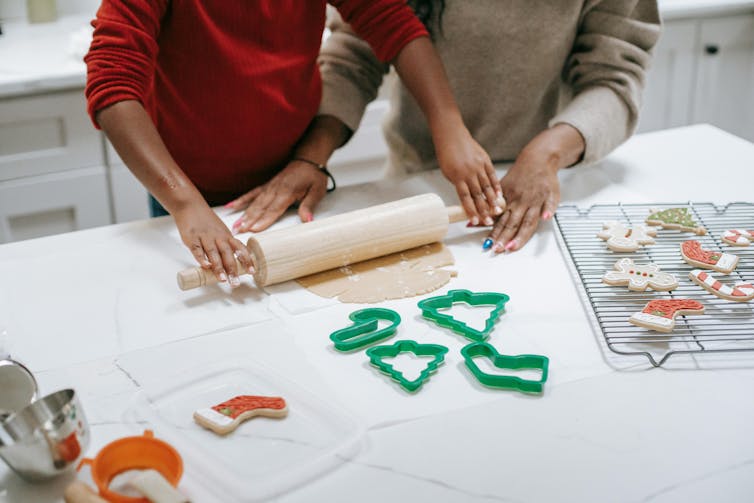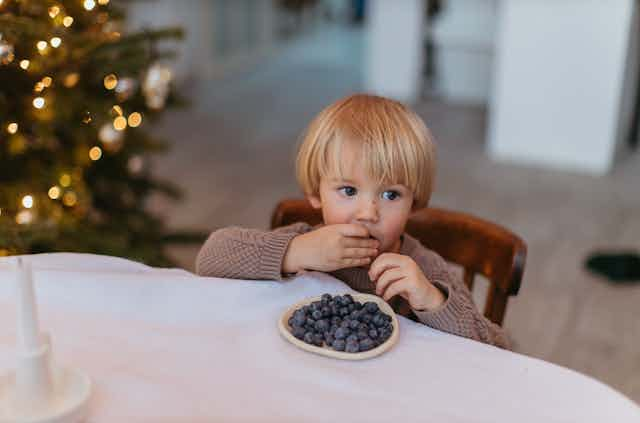Food-focused celebrations like Christmas can be very stressful for parents with children who can’t eat just everything. Perhaps they are selective eaters or have allergies and intolerances.
On top of making sure their children get enough to eat and don’t eat anything they shouldn’t, family reactions and judgement can be overwhelming.
However, parents can navigate these situations and foster healthy eating habits with a few strategies.
1. Set expectations early
Gently discuss your child’s needs with the celebration host beforehand.
This helps friends and family understand what is helpful and unhelpful when supporting your child’s eating.
Setting boundaries around conversations about your child’s eating habits can be beneficial. For example, you can ask people not to comment on how much or little your child eats. Most people appreciate the heads up and are willing to accommodate.
Read more: Food allergy and intolerance: five common myths explained
2. Have a plan B
If Christmas lunch is going to be overwhelming, or you can’t ensure the food served will be something your child can eat, it might be easier to feed your child beforehand.
This allows you to relax and join the celebrations without worrying about your child going hungry. Alternatively, you can bring along a selection of foods for your child to ensure they can participate in the mealtime, without the pressure of trying new foods or having limited options.
Including some familiar foods in the spread ensures that there’s something on the table your child is comfortable with.

3. Minimise anxiety
Holidays can be a time of increased anxiety, especially for selective eaters. Kids may find it challenging to cope with changes in routine and the excitement of the day.
Try and minimise changes to normal routines where you can, and make sure you and your child get some down time between activities. When children are anxious, they are less likely to want to eat.
4. Focus on togetherness
Reduce the food focus by emphasising the importance of connection and togetherness during mealtimes. This helps creates a relaxed environment, which helps your child associate mealtimes with positive emotions rather than pressure to eat.
It might help to have some talking points such as Christmas cracker jokes, highlights of the of the year, or what we are most looking forward to in the new year (rather than just talking about the food).
Read more: How can kids have a healthier Halloween? And what do you do with the leftover lollies?
5. What are other guests doing?
The presence of other people can change a behaviour, this is what reseachers call “social facilitation”. We see this when children are more adventurous when eating with their peers at school or daycare compared to at home.
Festive events offer opportunities for children to observe others enjoying a variety of foods.
6. Lots of things to try
Despite concerns, festive occasions often provide incidental, low-pressure situations for children to explore new foods.
Use this time to encourage them to see, touch, smell and taste various treats. This can foster food acceptance at their own pace.
7. Give children food-related jobs
Research suggests being involved in food preparation can increase eating enjoyment and reduce picky eating.
So ask your kids to help with simple food preparation, serving food, clearing away plates and mixing ingredients. This allows your child to have sensory exposure and be part of the experience, with no expectation they must eat the food.

8. Be vigilant about allergens
It’s okay to be vigilant about checking labels for any ingredients that might cause a reaction in your child. Ask family members to label foods that contain potential allergens, especially if you have older children serving themselves.
Remember to be careful with buffet-style meals as the risk of cross-contamination is higher as serving utensils could be moved between dishes.
Everyone deserves to enjoy the holidays, including parents and children. So don’t hesitate to do what you need to ensure your and your child’s wellbeing.
You can find more information for managing a picky eater at the Grow & Go Toolbox.

